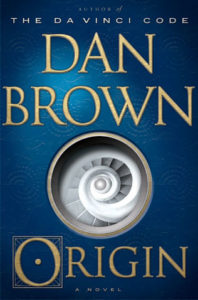The Bigger Picture … with Marty Cheek – Will artificial intelligence bring out the ‘angels’ or ‘demons’ in us?
Published in the January 10 – 23, 2018 issue of Gilroy Life
 Dan Brown’s latest Robert Langdon thriller “Origin” is a fun sci-fi read with a lot of food for thought on what might await humanity in the not-so-distant future as artificial intelligence grows ubiquitous in our lives. The novel is not quite on par with “The Da Vinci Code” or my personal favorite of the series, “Inferno,” but “Origin” does raise many intriguing ideas about the fate of the world’s religions that soon will be confronting digitally-born entities.
Dan Brown’s latest Robert Langdon thriller “Origin” is a fun sci-fi read with a lot of food for thought on what might await humanity in the not-so-distant future as artificial intelligence grows ubiquitous in our lives. The novel is not quite on par with “The Da Vinci Code” or my personal favorite of the series, “Inferno,” but “Origin” does raise many intriguing ideas about the fate of the world’s religions that soon will be confronting digitally-born entities.
The story fits the typical Dan Brown plot by forcing Langdon to keep figuring out puzzle after puzzle in a high-stakes cat-and-mouse chase. The book is set among several cities in Spain. The symbologist hero and Abra Vidal, an art curator at the Guggenheim Museum in Bilbao and fiancee to the heir to the Spanish crown, face a religiously-motivated killer as they attempt to reveal to the world a computer genius’s answers to the big questions: “Where did we come from?” and “Where are we going?” Langdon and Vidal receive help from an AI system named Winston who turns out, ironically, to be the most human character in a book filled with cardboard-cutout personifications of people.
Brown’s novel tells that futurists estimate real AI technology will emerge in a decade. We’re starting to see its precursors with Siri and Alexa, the voice-activated interfaces common in digital devices. And as we soon start seeing AI routinely installed in vehicles, this advanced computer system will literally have our very lives in its digital control.
No doubt, AI is a reality for humanity’s future. And, reflecting the title of Brown’s first Langdon thriller, this technology can open the doors to “angels” or “demons.” The physicist Stephen Hawking and the electric car entrepreneur Elon Musk see AI on the side of the demons. They have publicly warned about the dangers humanity faces as AI evolves into information systems that take increasing control of our lives. It’s not too difficult to consider that AI might evolve into a sentient “lifeform” with self-awareness and maybe even self-mobility as robotics technology takes leaps in development in the next few decades. We’re not necessarily talking the “Terminator” movie series here, but the fact is humans happen to be really good at weaponizing technology.
Maybe AI might not be a bad thing. I joked with a friend recently that America might be in better hands with an AI system in control of the government than the partisan-driven politicians more interested in preserving their power than serving the people.
Call me an optimist, but I prefer to place AI on the side of the angels. But I do add the caveat that programmers will build into this technology a system of checks and balances so human intelligence will be able to monitor AI’s control of our daily lives. Like any digital device, AI will serve as a tool impacting the quality of life of its users depending on how its applications are used. We’re just now seeing technology rewiring our brains as people become increasingly dependent on smartphones, laptops, and other digital devices. In the 2016 election, a foreign power manipulated the collective thinking of American voters using social media. As a journalist, I was intrigued by Brown raising the question in “Origin” of an AI system manipulating society by feeding a global news media machine information received by millions of people, thus impacting politics and economies.
If Brown is right, we have about 10 years to deal with the ethical questions and moral quandaries we face with artificial intelligence advances in the research labs of Silicon Valley and elsewhere. And, as Brown suggests in “Origin,” once AI technology receives autonomy and can start programming itself to evolve into higher and higher levels of computing power, we very well might be unleashing a new “species” of life. We’re at a point where we need to use our human intelligence to decide how best to adapt to this brave new world that waits a decade away.
